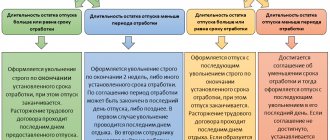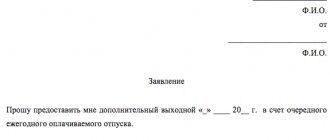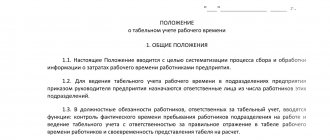Is it possible to fire an employee if the last working date falls during this time?
At the legislative level, there is no prohibition on terminating the relationship between an employee and an employer during non-working hours. According to Art. 84.1 of the Labor Code of the Russian Federation, the date of termination of the contract is considered to be the last working day of a person, except for situations where the citizen did not work, but the position was retained for him (while on vacation, on sick leave).
At the same time, Art. 14 of the Labor Code of the Russian Federation indicates that if the dismissal date falls on a non-working day, it is transferred to the next working day.
It is recommended, if possible, to prevent termination of the employment relationship on weekends, for example, by trying to persuade the employee to rewrite the application. Otherwise, the head of the organization acts at his own discretion.
In practice, the following options for terminating a contract during non-working hours are usually used:
- Termination of the contract is postponed to the next working day . For example, if the dismissal falls on a Sunday with a six-day work week, then the termination of the contract is shifted to Monday. This rule is based on Part 4 of Art. 14 Labor Code of the Russian Federation.
- The termination of the working relationship is carried out on the last day of work before the day off . Is it possible to fire someone on Saturday with a five-day work week? This is determined by Part 4 of Art. 14 of the Labor Code of the Russian Federation - the contract is terminated earlier, on Friday.
- The employment relationship ends immediately on the day off .
This requires the return to work of personnel employees, accounting departments, with corresponding payment for their labor in double the amount or subsequently providing additional rest time. This option occurs during shift work, when the employee’s last day of work falls during non-working hours for other employees (Rostrud letter No. 863-6-1 dated June 18, 2012).
The second situation can be considered a violation of employee rights. Earlier termination of the contract reduces the period for withdrawing the application if the person has not yet made a final decision to leave.
With any agreement with an employee on dismissal (early or late), it is recommended to document it (for example, in the form of an application).
If a person is on vacation or sick leave, he actually does not work, but his place is reserved . In this case, it is permissible to indicate a non-working day for the employee as the time of termination of the contract. But it is important to remember that terminating the employment relationship with an employee during this period is allowed only at his request after submitting his resignation letter. If the initiator of dismissal is the employer, you must wait until the citizen returns to work.
Can this be by choice?
An employee has the right to resign by his own decision at any time, having previously notified the employer about this within the period specified by law (Article 80 of the Labor Code of the Russian Federation).
Typically, this period of information (working out) is 2 weeks, but in some cases it may increase or decrease.
If the official day of dismissal falls on a weekend, it is transferred to the next working day (for example, from Sunday to Monday). However, this may create difficulties for the employee, since he may have planned to start a new job that day.
In this case, it is recommended to rewrite the application so that the departure occurs during working hours. It is also permissible to dismiss an employee on the last working day - for example, on Friday if the dismissal fell on Saturday. In this case, the warning period is reduced, which is allowed by Art. 80 Labor Code of the Russian Federation.
Sometimes the time of termination of the contract falls during a long period of holidays, which significantly delays the completion of the procedure. It is recommended to issue an order in advance, but indicate the date of termination of the relationship between the parties as in the application.
For example, Ivanova received a letter of resignation on 02/08/2020 without indicating the date of dismissal. The standard 2-week work period for her ends on 02/22/2020 - Saturday. February 23 and 24 are holidays. Ivanova refused to postpone the termination date to 25.02 because she is starting a new job.
By agreement with management, she was fired earlier - 02/21/2020, but the dismissal date was set in the order as 02/22/2020. The calculations and issuance of working documentation were also carried out in advance (02/21).
This approach makes it possible to resolve the current situation to the benefit of both the employee and the employer, but may raise questions from the Labor Inspectorate. It is better to agree with the employee so that he indicates another day in his resignation letter. The employer can shorten the working period if the employee requests it .
Under a fixed-term contract
When an employee works in an organization under a fixed-term contract, a frequent situation is that the last day of its validity falls during non-working hours. In such a situation, it is recommended to carry out the dismissal on the next working day (decision of the Primorsky Court No. 33-2581 of March 31, 2014) - this version is followed by the majority of practicing lawyers.
However, in practice, termination of a fixed-term contract occurs directly on a non-working day (determination of the Lipetsk Court No. 33-1585/2012). In this case, the order is issued on the working date on the eve of dismissal, the actual date of departure is stated (Saturday, Sunday, holiday).
When terminating a fixed-term contract, it is important to respect the employee's notice period, which is 3 days.
For example, a contract was concluded with Smirnova on December 28, 2019 for a period of 3 months, that is, it expires on a non-working Saturday, March 28, 2020. The employer informs the employee about the termination of the employment relationship 3 days in advance, that is, 03/24/2020. The dismissal procedure was carried out on Monday 03/30/2020.
By agreement of the parties
The advantage of this method of dismissal is the possibility of mutual determination of the date of termination of the contract. That is, when agreeing on the terms of the agreement, it is important for the employer to check whether the day of termination falls during non-working hours. Calculation of the termination date of the contract is not required in this case, since working off is not applied.
The agreement provides the parties with the opportunity to terminate the contract on the day of signing the document by approving a working date for this - then there will be no problems with the procedure. The order and entry into the labor record are issued on the day of dismissal.
If the day of termination nevertheless falls on non-working hours, it is recommended to act according to the general principle and carry out the procedure on the working day following the non-working day (Article 14 of the Labor Code of the Russian Federation). If the employee is not satisfied with this option (for example, when starting a new job), by written agreement, dismissal can be carried out on the last working date on the eve of the day specified in the agreement.
What to do if your dismissal date falls on a weekend
Although Article 14 of the Labor Code establishes that deadlines that fall on a weekend or non-working day end on the day following the weekend. That is, on the first working day, after a day off. But it is not always legal and justified to dismiss an employee several days later than the date specified in the application. In this particular case, the employee may already go to work in another place on Monday if he is employed by another company.
Why is it important to fire on the day before the day off? The fact is that the day on which the employee quits is considered his last working day
Thus, he must finalize it completely. Sometimes employers change layoff dates. In the order, they indicate the date of dismissal, which is according to the law, but in fact the working day is the day following the day off.
Or, on the contrary, all payments are made to the employee on the eve of the day of dismissal, and the order and all papers are drawn up on a day off. Neither the labor authority nor the court explains whether this is legal. Apparently, in case of dismissal of an employee at his own request, there is no dispute between the parties. And, accordingly, the case does not reach the court.
Also, in some cases, dismissal on a day off is possible when it occurs by agreement between the employee and the enterprise. Or, if the employment contract ends on a date that falls on a weekend. In any case, the concept of a day off should be considered as a general day off at the enterprise. Then, simply, there will be no one to carry out the dismissal procedure, because everything is on the weekend. Or, consider a specific employee’s day off.
If the day of dismissal is a day off
Considering the provisions of Article 84.1 of the Code, an employee should be dismissed in all cases on his last working day. Thus, it is understood that even if the employee has a shift work schedule, and the day of his dismissal fell on his day off, the employee should be fired on his last working day. This is partly due to the fact that the same Labor Code establishes that on the last day of work, an employee must receive a full payment from the enterprise, a work book, and a dismissal order must be signed in the “read” column.
But here’s the situation: the day of dismissal falls on a weekend, and the employee is on sick leave. How to proceed? Based on the provisions of current legislation, an employee has the right to write a letter of resignation while on sick leave. Or on vacation. At the same time, he can send an application by mail without appearing in person at the enterprise. In accordance with labor legislation, the period of so-called two-week work begins on the day the employer receives a written application from the employee. The calculation of the two-week period begins the next day. Accordingly, if an employee submitted an application on Friday, then theoretically, the countdown day for the two-week period should begin on Saturday.
But, in practice, the dismissal order is issued on the same date as indicated in the employee’s application. It is prohibited to delay the dismissal of an employee and to retain his work book. In fact, it turns out the following: an employee who is on sick leave has worked the two weeks required upon dismissal, without leaving sick leave. The employer issues an order on the same day when the dismissal should occur. In fact, the employee did not go to the enterprise to get documents, because he was undergoing treatment. After this, you need to send a copy of the dismissal order to the employee, and a notice of the need to appear for a work book.
Thus, if the day of dismissal falls on a weekend, settlements with the employee should be made the day before. In the event of liquidation of the enterprise, or layoff, the day of dismissal is considered to be the last actual working day of the employee, before the day off. The same rule applies to dismissal on holidays or non-working days established by the Government. By agreement of the parties, the employment contract can be terminated at any time. Thus, the parties must, at their own discretion, set the day of dismissal, taking into account working days and weekends.
How to fire if the last date falls on a non-working date, and what date should the order be made?
Termination of the contract during non-working hours is carried out according to the standard algorithm:
- the personnel service issues an order (based on an application from the employee, an agreement between the parties and other documentation);
- The employee should be familiarized with the paper against signature;
- the corresponding entries on the termination of the contract are entered into the employee’s personal card and work book;
- on the last day, payments are settled with the citizen and work documentation is issued.
A special feature of dismissal on a non-working day is the need to correctly enter the dates on the papers in order to avoid violation of labor laws and the rights of the employee.
The recommended procedure for termination and documentation depends on the circumstances of termination of the labor relationship of the parties:
- The employee has a day off, while the administration is working.
This situation arises, for example, when working a shift schedule or writing a letter of resignation while on vacation. The dismissal procedure is carried out on the current day. The order is issued on the date of termination of the relationship, the employee is invited to sign the documentation and issue a work book. If the employee does not show up at the organization, he is sent a notification with a request to pick up the papers or give consent to send them by mail. The calculation in the absence of a person is provided no later than the next day after receiving the request from him. - It’s the administration’s day off, the employee’s last day of work.
For example, a citizen’s work shift falls on Saturday or Sunday. In this case, the procedure for terminating the contract will not be postponed; the order must be issued on the day of dismissal (weekend). Working documentation and calculations are also provided on non-working days. For this purpose, employees of the HR department and accounting department are involved in working on weekends, for which they are provided with double pay or the right to an additional day of rest. - The employee and the administration have a day off. In this case, the date of dismissal is transferred to the next working day. The order indicates the date of termination - the last working day.
- At the end of the term of a fixed-term contract, a dismissal order can be issued either directly on a day off, on the next working day, or the day before. In the latter case, the actual date of departure is indicated in the document.
- By agreement with the employee, it is possible to terminate the contract on the eve of a weekend or holiday (on the last working day). Then the order is dated by the final working date, the day of dismissal is indicated as a day off. The work book is issued and payment is made the day before.
Non-working days for the administration
A non-working day for an employee does not prevent his removal from office, but days off for the administration of the enterprise can significantly affect this process, because a person is not legally required to work on holidays and weekends.
In the event of termination of the contract between a company and an employee working in shifts, the date of the last working day may be not only his shift, but also a day off.
If the personnel department is not working at the time of the employee’s resignation, then the manager cannot postpone the date of dismissal for this reason. The head of the company is obliged to ensure that the dismissal procedure is carried out under any conditions. To do this, he should recall the HR department or a certain person from vacation, compensating him for the lost rest time in double amount or providing him with another day off.
This situation is subject to detailed consideration. For example, the entire administration of the company works full-time with fixed days off on Saturday and Sunday. The company's employees work in shifts, regardless of the day of the week. Ivanov S.P. submits his resignation of his own free will.
In accordance with the contract, he must work for the company for another 14 days. His last working day falls on September 20 (Sunday).
Can the manager issue a work book to Stepan Pavlovich on Friday the 18th if the contract date ends on Sunday? The answer to this question will be negative. The employee must be fired on Sunday the 20th. The manager must resolve all subsequent details directly with the administration.
Recording in labor
The work book is filled out and issued on the employee’s last day of work. The entry must contain:
- date of dismissal - filled in on the basis of the order, that is, it must be identical to that indicated in the document (it is permissible to enter a day off or holiday);
- basis - corresponds to what is specified in the order, a reference to the regulatory legal act must be included;
- the number and date of the document on the basis of which the entry is made - that is, the order data.
The record is certified by the signature of an authorized person and the seal of the organization.
Sample entry in the work book upon dismissal:
If the dismissal is carried out on the eve of a day off, the work book must be given to the employee on this date, that is, in advance. Otherwise, the employer’s actions are regarded as a delay in providing documentation to the employee.
When will the employee be paid?
On the last date of work with the employee, full payment is made for payments, which include:
- earnings;
- compensation for the vacation period not taken off;
- severance pay, if provided for by regulatory documentation;
- bonuses, incentives and other payments specified by local acts of the enterprise.
When to pay payroll to an employee who quits during non-working hours is determined based on the order data:
- On the next working day after the holiday . If the date of dismissal is postponed, in accordance with Art. 14 Labor Code of the Russian Federation.
- On the eve of the day off (on the last date of work) . If the order is issued on the employee’s last working day.
- Directly on a day off . For example, with a shift work schedule.
If the day of dismissal falls during non-working hours, it is advisable to reach a compromise between the parties when determining the date of termination of the contract, which will avoid conflicts and challenging the procedure in court. If possible, it is recommended to reissue the application or other documentation indicating the working day of the employee’s departure.
If an agreement cannot be reached, dismissal is carried out on the next day of work after the day off or on the day before the last working date. In some cases, the procedure is carried out directly during non-working hours (for example, during a shift schedule).










